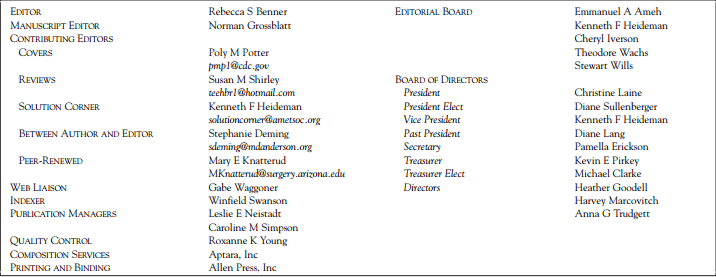The 2010 annual-meeting theme, “The Changing Climate of Scientific Publishing—The Heat Is On”, had already been determined when we started planning the program. Our goal was to address both global climate change and the role of science editors in communicating relevant research on the topic. We also wanted to educate meeting participants about the rapidly changing nature of the workplace and technology in the 21st century.
The Program Committee stepped up to this challenge and developed a roster of sessions and plenary speakers that exceeded our highest expectations. We were fortunate in anchoring the meeting theme with an early agreement from J Marshall Shepherd, of the University of Georgia, to give the keynote lecture (p 150). If the audience had preconceived doubts about the scientific basis of the directions of climate change and the potential effects on our lives, they were erased by this sobering dose of reality. We were delighted when George Luber, of the Centers for Disease Control and Prevention, agreed to give a plenary lecture on the effects of climate change on public-health issues and policy (p 151). With two lectures from scientists already in the program, we were especially pleased when Michael Lemonick—a book author, former writer for Time magazine, and teacher at Princeton University— agreed to give a plenary lecture on climate change from a journalist’s perspective (p 152). Thus, the keynote and plenary lectures represented our attempt to meet CSE’s objective of educating the membership about important current issues that affect our lives and working environments, with the hope that—as publication professionals—we can influence the direction of our profession accordingly.
One of our concerns in developing the program was how to fit the themes of the sessions into the overall meeting theme of climate change. We decided to do it in a metaphorical way, emphasizing how technical and societal changes influence the workplace and technological climate in which we practice our various professions. The Program Committee approached the task with gusto, and you enjoyed the results of their efforts at the meeting.
In thinking back over our experience as cochairs of this committee, we feel a bit foolish about our initial fears that the program would be difficult to put together. A year ago, it seemed to be a formidable task, fuzzy in concept and—to be honest—intimidating because of our lack of experience with CSE program committees. We had no reason to worry! Previous program chairs were hugely helpful, as was the CSE leadership. But most of all, we had a terrific Program Committee that was a joy to work with. The members did the work, and they deserve the credit: Peter Adams, Tony Alves, Patricia Baskin, Mary Anne Baynes, Philippa Benson, Bob Edsall, Betsy Fleischer, Barbara Meyers Ford, Carissa Gilman, Torben Kitaj, Devora Krischer, Andrés Martin, Ana Marusic, Debbie McClanahan, Kimberly McGhee, Kevin Pirkey, Mauricio Rocha e Silva, Jacob Rosenberg, Mary Beth Schaeffer, Angie Schmeckebier, Misko Sheehan, Bill Silberg, Adrian Stanley, Mary Whitman, and Holly Zoog.
Denis Baskin
2010 Program Chair
baskindg@u.washington.edu
Ken Heideman
2010 Program Chair
kheideman@ametsoc.org

